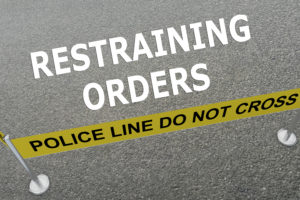Hackensack Lawyers to Vacate a Restraining Order in New Jersey

In order to remove a final restraining order in New Jersey, the plaintiff must voluntarily dismiss it, or the defendant must file a motion to vacate it with the court. This is important because, in NJ, domestic violence restraining orders are permanent and never expire. So, if a final restraining order is issued against you, it will stay with you forever unless you are successful in having it vacated.
If you or a loved one needs assistance vacating a restraining order in NJ, the NJ restraining order attorneys at the Tormey Law Firm LLC can help. Our lawyers have extensive experience dealing with these issues in Family Court and have handled these cases in almost every county in the State of NJ. In addition, Mr. Tormey has been cited as a legal resource on domestic violence in several NJ publications and has appeared on CBS radio as a guest expert.
As a result, our attorneys are ready and able to assist you with your restraining order matters immediately at (201)-330-4979. The initial consultation is always provided free of charge.
How Do I Get Rid of a Final Restraining Order in NJ?
In New Jersey, if a domestic violence victim applies for a restraining order against an individual, they will initially be issued a temporary restraining order (TRO) and a hearing date for a final restraining order (FRO) will be set. This hearing usually happens about 10 days after a TRO is issued. If an FRO is issued, the order is permanent. It does not expire with time and will remain in effect unless and until the order is vacated by the court.
For an individual against whom a final restraining order is issued, the order presents a constantly looming threat of potential violation and, therefore, arrest. To get an FRO vacated, the defendant, or individual against whom the order was issued, must petition the court. The victim is also able to petition for the order to be vacated.
In determining whether a final restraining order should remain in effect or be vacated, the court will consider several factors relating to the current circumstances of the defendant and the victim, their current relationship, whether the victim has an objective fear of the defendant, and more.
Initiating a Motion to Vacate a Restraining Order in New Jersey
A Motion to Vacate is a formal petition or request made to the court by either the defendant who is subject to the final restraining order or the victim involved. In order to make such a request, the petitioning party must have good cause and show a change in circumstances from the time the order was issued.
In order to remove a final restraining order (FRO) that was issued in Bergen County, a defendant must file a motion to vacate the Judge’s Order in the Bergen County Superior Court, Family Division. Here is the information:
10 Main Street
Hackensack, NJ 07601
201-221-0700 ext 25170
Also, according to court rule, the defendant must also order the transcript of the original TRO hearing if it exists. If it does not exist because it’s too old, the court will provide a letter to that effect which the defendant should attach to their motion papers.
There are several factors that constitute “good cause” under applicable New Jersey case law to remove a restraining order. Some of these factors relate to the victim such as the victim’s consent to vacate the order and the victim’s lack of objective fear of the defendant. Other factors relate to the relationship between the defendant and victim, as well as whether the victim’s opposition to vacating the order is made in good faith. Finally, the court will consider the age and health of the defendant and whether the defendant has attended counseling, been violent towards others, used drugs or alcohol, or had contempt convictions for violating this restraining order or any other restraining order.
Next, the petitioner must demonstrate that there has been a substantial change in circumstances since the final restraining order was granted. There are numerous scenarios which could meet this condition, but the key is that the change in circumstances must be substantial. For example, perhaps a final restraining order was issued against a defendant for physical violence towards a victim while the defendant had a severe addiction to heroin. If the defendant can later show that they no longer use heroin and have been clean for a significant length of time with no other instances of violence towards others, this may constitute a substantial change in circumstances. A less extreme example of a substantial change in circumstances could simply be a dramatic improvement in the relationship between the victim and defendant evidenced by long term cooperation in co-parenting and other factors.
Understanding Evidentiary Hearings for Restraining Order Removals
A precedent setting case in New Jersey, Carfagno v. Carfagno, 288 N.J. Super., 424 (1995), established the legal right of a defendant against whom a final restraining order was granted to an evidentiary hearing if they establish a basic showing that there is a basis for review of the order. In this trial, both the defendant and victim can present witness testimony and other evidence. During a Carfagno hearing, the court will consider many of the factors outlined above to determine whether good cause exists to vacate the order.
Role of Victims in Contesting Motions to Vacate NJ Restraining Orders
Before a final restraining order can be vacated by the court, both sides have an opportunity to be heard. Unsurprisingly, it is not uncommon for a victim to oppose a defendant’s motion to vacate a final restraining order. However, while the opinion and perspective of the victim are relevant to the court’s decision, they are far from dispositive. A defendant can still overcome a victim’s opposition by demonstrating that they are not a danger to the victim, are sober, have attended counseling, have not had any trouble with the law or received accusations of violence from anyone else, and other case-specific factors.
Most notably, New Jersey courts have held that a victim’s fear must be objective, not simply subjective. The court will consider whether a reasonable person in the victim’s circumstances would fear the defendant. If the court concludes that a reasonable person would not fear the defendant, then they may vacate the order despite the victim’s opposition.
Reasons Behind Requests to Remove Restraining Orders in NJ
Either a victim or defendant can request for a restraining order to be dissolved. The motivations for a defendant to make this petition are obvious and numerous. A restraining order can have a very negative effect on the defendant’s relationship with his or her children, along with other relatives or mutual friends of the defendant and victim. It can also limit the defendant’s ability to travel freely and own or possess a weapon. Finally, for as long as a final restraining order is in effect, the defendant may risk violating the terms of the restraining order unknowingly or unintentionally, resulting in an arrest.
There are, perhaps, less obvious reasons why a victim may want a restraining order to be vacated, but some of the most common reasons are that the defendant and victim have reconciled or the restraining order is interfering with the victim and defendant’s ability to effectively co-parent their children and the victim no longer fears the defendant.
Frequently Asked Questions (FAQ) About Removing a Final Restraining Order (FRO) in Bergen County Court
FAQ: How long do I have to wait to file a motion to remove a FRO? There is no set time limit. However, we usually recommend waiting at least 5 years. This allows circumstances to change so that the motion can be viable. It also allows a defendant to attend counseling and to comply with the conditions of the FRO (no violations). It also allows both parties to move forward with their lives.
FAQ: Once the FRO is removed, do I need to expunge anything else? No. The FRO is vacated and lifted and all of the restraints are lifted. However, if you have any criminal record separate and apart from the FRO or you were convicted of contempt for violating the order, then that is a criminal charge and you would need to expunge that off of your record.
FAQ: Is there any limit to how many times I can try to file a motion to have this lifted/removed? No. But the judge can order you to pay her attorneys fees if they believe that the motion is being filed frivilously.
I want to get rid of an old restraining order NJ – Contact our Bergen County Office
Whether you were the previous victim of domestic violence or a restraining order was issued against you, a petition to vacate a final restraining order frequently brings up a lot of charged emotions and unpleasant memories. Through this stressful and uncertain process, you need an experienced advocate by your side who has a deep knowledge of New Jersey law in this area and will serve as a dedicated advocate for your interests. We can assist with your successful petition to vacate a final restraining in Haworth, Lyndhurst, Closter, Allendale, Wyckoff, Lodi, any other town in Bergen County and northern New Jersey. For immediate assistance potentially removing a restraining order in NJ, contact our Hackensack office now for a free initial consultation at (201)-330-4979.


